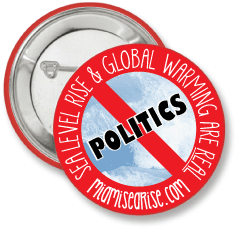There Will Be Riots & Blood In The Streets
Welcome to The Sink or Swim Project’s first “vlog” (video blog). You can watch the video below or you can read my old-school post like I’ve been publishing for years. Let me know what you think about the vlog or the post, or anything else.
The recent holidays reminded me how much I love my family traditions.
Whether it’s how we decorate our home for Halloween, traveling to the Smoky Mountains of Tennessee to have Thanksgiving dinner with 90 or so members of my mom’s side of our family, singing Silent Night during Candle Light Service at Church on Christmas Eve here in Miami or spending New Years’ Eve under a pitch black sky painted with millions of stars on the remote island of No Name Key. If given a choice, or a vote, I’d not change a single one of those traditions or many others that I treasure.
And I don’t think I am much different than most people. Most folks don’t seem to like change whether in their own holiday traditions or their day to day lives. I get it.
In order for us to fix our climate change crisis we will, however, need to conceive and embrace the word change on a massive, likely often uncomfortable scale, global scale and that starts right here in the USA. But it will be hard. Very hard is my guess. Perhaps approaching going to war hard in some ways in terms of the short term sacrifices, pain and change that’s needed to save our planet much less mitigate the economic and social impact on society.
“Who controls the past controls the future. Who controls the present controls the past.”
– George Orwell, 1984
As 2019 begins there are examples around us of just how difficult these changes will be, especially the early or voluntary pioneering ones that are popping up all over planet earth. To some people these changes and the resulting response will seem are straight out of George Orwell’s Nineteen Eighty-Four or Anthony Burgess’s A Clockwork Orange but they will not be some view of dystopian fiction but our reality.
Autonomous electric cars?
Imagine what people in most of the last century would have thought about news of self-driving vehicles yet all of a sudden they are coming true all over our planet as I type these words. And while we are not (yet) at the point of the Jetson’s promise of flying cars it’s clear that industries and governments are embracing the promise of more efficient, less costly, and safer transportation. General Motors has announced that it is shifting its entire line-up towards electric cars. Ford has done just the same thing, announcing some layoffs and a shift to electric cars.
Insurers all over the planet know that 94% of all accidents are tied to human error and realize that the need for auto insurance in the future will greatly diminish as self-driving cars become prevalent and are, therefore, planning to focus their businesses in other areas of risk over the next five to ten years.
Wielding rocks and knives, Arizonans attack self-driving cars
And yet, people are fighting back against their fears that machines are taking over just as would be the case in a science fiction novel. The recent article entitled Wielding rocks and knives, Arizonans attack self-driving cars sure caught my attention and is just one example of our near term future filled with change and transition. Waymo, a part of Google, makes self-driving cars and vans and since 2017 has been piloting them in places like Chandler Arizona.
Just a few months ago the New York Times ran a story about how there have been almost two dozen attacks on these vehicles by people with concerns over the use of the artificial intelligence technology they use, their safety or the possibility that some people could lose jobs. Some have thrown rocks. Some have slashed their tires. Others have tried to run the vans off of the road.
Yellow Vests, Tear Gas, Water Cannons & Guns
On Christmas Eve the picture above caught my attention and is, I fear, a precursor to the decades ahead and what many will face in transitioning towards a sustainable future. A future that will not be achieved, it seems, without established industry and many good people all over the world fighting back. Along the way people will be jailed, beaten and perhaps killed. If people are already attacking cars, for gosh sake, when the stakes really start to increase I think we are in for some dark, warlike times.
This picture is of a policeman in Paris who had pulled his gun out on French citizens, protesters who had taken to the streets for the sixth weekend in a row to riot against a proposed carbon tax, a device designed to nudge consumers away from fossil fuels such as gasoline and towards sustainable solutions such as electric cars, public transit, walking and so forth. In November and December those riots evolved into protests over a wide range of frustrations including wage stagnation and the French government including President Macron but it started with news of the new carbon tax.
The good news is that the police officer in this picture did not fire his gun and understandably was responding to threat of the large crowd that approached him. That situation was diffused but others will not, I fear, be so lucky in the future as the need for such taxes and other changes in our ways of life increase as global temperatures rise. The so called Yellow Vest riots, led by people wearing yellow vests in solidarity over their concerns, have continued thus far in 2019 and what is happening should alarm all of us but also should serve notice of just how hard the changes we will need will be. Yellow Vest riots in France thus far in 2019 have seen:
A river boat that houses a restaurant on the Seine River set on fire.
Motorcycles and cars all over Paris burnt by protesters.
Smoke and tear gas covering the Orsay Museum and famous gold dome of the French Academy.
A government building, the Ministry for Parliamentary Relations, attacked and officials in that building evacuated.
Police and their equipment all over France attacked and destroyed.
Vandalism, looting and chaos filling French streets by as many as 50,000 protesters a night.
“In the scientific community the urgency has always been clear—if we want to substantially slow the warming of the climate, then dramatic reductions in CO2 are required.”
– Dr. Ben Kirtman, Professor of Atmospheric Science, University of Miami’s Rosenstiel School of Marine and Atmospheric Science
No, these revolts and riots are not out of some science fiction movie but real life. Real people faced with changes that they perceive will hurt their wallets and ways of life. And yet, without starting to truly solve our climate change crisis at this time the cost will only rise and rise until the time comes that it’s too late.
As 2019 begins all of us must consider how we can leave this place we live in, earth, in better shape by the ends of our lives than we found it when we were born. And that starts with eliminating carbon pollution from our atmosphere and oceans.
“It will take dramatic and immediate reductions in CO2 emissions, both for the U.S. and globally, to achieve that goal.”
– Dr. Brian Soden, Professor of Atmospheric Sciences, University of Miami’s Rosenstiel School of Marine and Atmospheric Science
Consider a report just out by an independent economic research firm, the Rhodium Group, that uses data from the U.S. Energy Information Administration and estimates that carbon emissions increased 3.4% in 2018, the largest increase in eight years. An increased fueled, pun intended, all over our economy from Buildings and Industry to Transportation and Electrical Power. The scientific data shows us that carbon dioxide levels are higher today than they have been in the past 800,000 years. And the science shows us that it will not be sufficient to stabilize our climate, it will require that in the decades ahead that we cool it. Experts estimate that to stop more warming, more damage, that 2020 (NEXT YEAR) needs to be the peak of man’s global greenhouse gas production and that over the 50 years that follows we will need to reduce emissions to zero and then beyond that produce negative emissions.
We can, of course, elect to not change our ways and allow the continued growth to warm our planet to catastrophic levels that leave us no time to make the dramatic changes that are needed to offset the worst possible outcomes, outcomes that threaten the very survival of places like Miami, the Everglades and the Florida Keys. Outcomes that will lead an estimated 2.5 Million people in South Florida to become climate refugees and the same thing to happen to hundreds of millions of people all over earth. The choice is ours.
And when I say ours I mean every single person’s on the planet. The climate change crisis is not strictly a problem caused by the United States, nor one that we will solve alone. That’s why what’s happening in places as different as Arizona and France are telling about just how hard all of this will be. China, for example, produces 27% of global carbon emissions and, thus, countries of every size, region and political persuasion on earth must come together for the good of humanity and this place we call home. Global diplomacy on an urgent scale is needed and the time has come to set politics aside, educate people, create a plan and begin to implement transformational solutions to the problem.
Of course, if we don’t take serious action, actions that will forever change how we travel, conduct commerce and live, then the science will only become more and more ominous. And as temperatures and seas rise the riots, revolts, violence and madness will exponentially grow. What we see happening all over the world including here in the US will, I fear, be looked back upon as the beginning of the real upheaval and chaos unless we change. And no, none of this is or will be science fiction but the lives we have chosen because of fossil fuels.
Speaking of the recent holidays, Happy New Year to you. Here’s a new year’s wish to hoping that late in my life I can still celebrate Christmas in Miami and New Years on No Name, that those places and countless others all over earth will be accessible to my family and all of the generations in the future.



